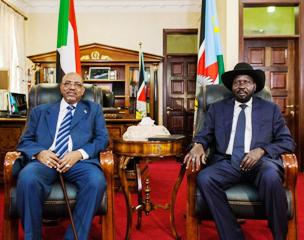Kiir-Bashir summit ends without an immediate solution on Abyei deadlock
October 22, 2013 (JUBA) – The highly-anticipated summit between South Sudan’s president Salva Kiir and his Sudanese counterpart, Omer Hassan Al-Bashir ended without immediate solution on the final status of the contested Abyei region.

However, a joint communiqué obtained by Sudan Tribune said both leaders only reached a consensus on general terms for administration and policing of Abyei during their meeting held in the South Sudan capital, Juba on Tuesday.
The two leaders, it added, also agreed “to expedite the establishment of Abyei Administration, Council and Police organs, and reaffirm that the 2% share of Abyei Area’s oil revenue, including arrears, will be paid to the Abyei Administration.”
Resolving the final status of Abyei still remains a major issue between Sudan and South Sudan after the latter broke away from the former in July 2011, leaving several unresolved post-secession issues.
Last year, the AU mediation team proposed holding a referendum in Abyei this month, but stated that only those residing permanently in the area will be allowed to vote in the plebiscite and decide whether they want to join Sudan or South Sudan.
The Sudanese government, however, rejected the AU proposal aimed at breaking the deadlock over Abyei referendum saying it ignored the eligibility of the Misseriya.
The Ngok Dinka openly declared their intention to conduct the Abyei area community referendum this month after a general conference its community members held on Friday in Abyei town last week.
The move, which was inadvisable by African and international bodies, would put the area at high risk of communal violence between the Ngok Dinka and Misseriya who also claim ownership of the same region.
KEY ISSUES IGNORED
Abraham Awolich, a director at the Juba-based The Sudd Institute said it would not be surprise if the Ngok Dinka went ahead and organised a referendum in Abyei.
“The protocol on Abyei remains the only unresolved issue in the CPA [Comprehensive Peace Agreement]. For that reason, the people of Abyei feel betrayed and it would not be surprised if they took a unilateral decision,” Awolich told Sudan Tribune.
The populations feel there is nothing left to be negotiated, other than to find a solution for resolving the final status of the contested region, he added.
Edmund Yakani, a South Sudanese activist said the two leaders completely ignored the “hot” issues their people were currently facing.
“Firstly, nothing tangible on Abyei which is the hot issue on the table. Giving 2% from the oil revenue is not the answer to the Dinka Ngok demand of referendum. Secondly the security issues were not seriously discussed”, Yakani said.
Abyei referendum can not be compromised with interest on oil flow or reduction of security pressure on khartoum by the rebels, he stressed.
Meanwhile, the two heads of states also agreed to enhance cooperation between the two central banks and banking sectors to facilitate payments and coordinate monetary and banking supervision policies.
(ST)
